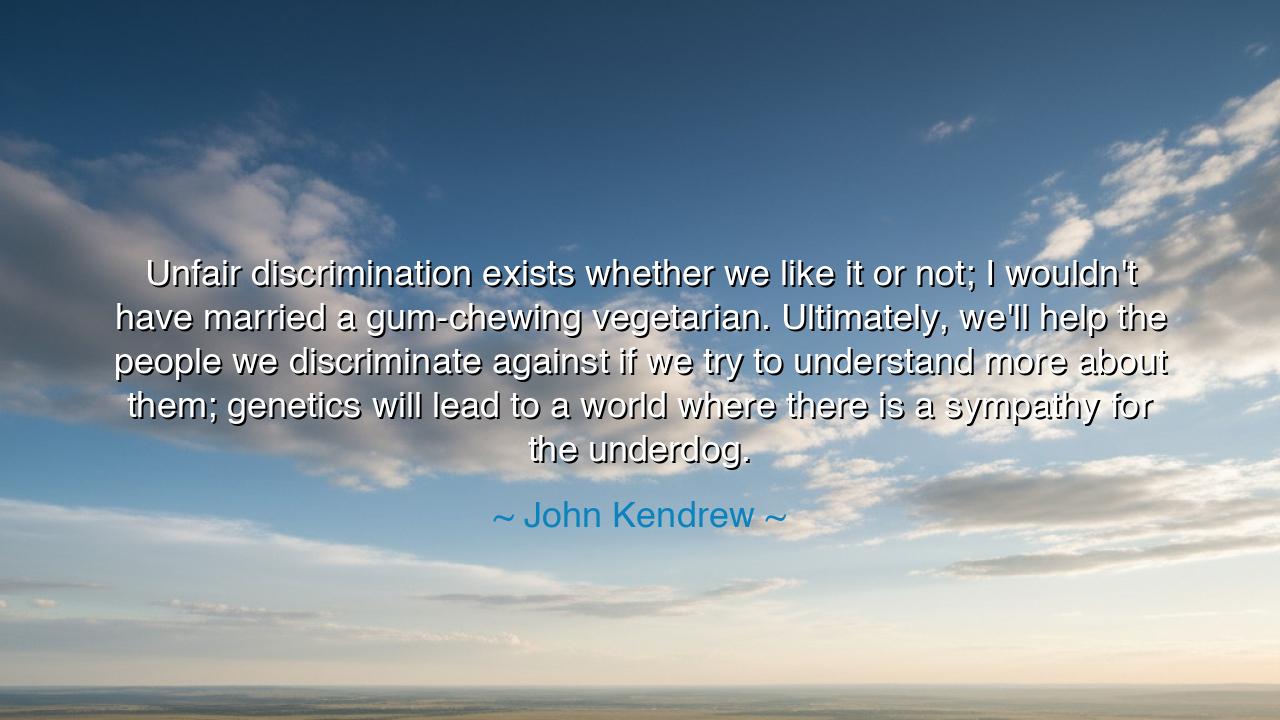
Unfair discrimination exists whether we like it or not; I
Unfair discrimination exists whether we like it or not; I wouldn't have married a gum-chewing vegetarian. Ultimately, we'll help the people we discriminate against if we try to understand more about them; genetics will lead to a world where there is a sympathy for the underdog.






"Unfair discrimination exists whether we like it or not; I wouldn't have married a gum-chewing vegetarian. Ultimately, we'll help the people we discriminate against if we try to understand more about them; genetics will lead to a world where there is a sympathy for the underdog." These words by John Kendrew echo a powerful and universal truth about the human condition—that discrimination, in its many forms, is deeply woven into the fabric of society, whether we acknowledge it or not. Yet, beneath this seemingly harsh statement lies a hope, a promise that the path toward understanding can break down the walls that separate us from one another. Kendrew’s words invite us to confront our own biases, to question them, and to reflect upon the potential for compassion and sympathy that arises when we embrace a deeper understanding of those we might otherwise overlook or dismiss.
Discrimination, as Kendrew acknowledges, exists in ways that are often unconscious, yet profound in their impact. Whether it is based on appearance, belief, culture, or even the seemingly trivial matter of diet—such as his humorous reference to a gum-chewing vegetarian—the roots of discrimination lie deeply within human nature. It is the impulse to draw lines, to separate the "us" from the "them." This behavior, however, often arises from ignorance, from a lack of understanding or connection to the lives and experiences of those who seem different. Kendrew, in his words, does not deny the presence of this unfair discrimination, but rather, he recognizes it as an inescapable part of our journey. In this acknowledgment, he asks us not to simply accept it but to transform it through knowledge and empathy.
History is filled with instances where discrimination has stifled progress and perpetuated inequality. Take, for instance, the treatment of the Jewish people during the Holocaust, where centuries of prejudice and hatred led to one of the darkest chapters in human history. Yet, as history often shows, even the most oppressive systems are eventually challenged by those who refuse to accept the status quo. In the aftermath of such profound injustice, there arose voices of reconciliation and understanding. Figures like Nelson Mandela and Martin Luther King Jr. carried the torch of sympathy for the underdog, advocating for a world where people could be judged not by the color of their skin or the religion they followed, but by the content of their character. It is these figures who exemplify Kendrew's belief that the more we understand those we discriminate against, the more likely we are to help lift them out of their suffering.
The wisdom of Kendrew’s quote lies in its acknowledgment of genetics—the idea that over time, our understanding of humanity will evolve. Just as science and genetics have taught us that we are all connected by a shared human experience, so too will our evolving knowledge foster deeper empathy. The genetic connection between all people, regardless of their race, creed, or background, will, Kendrew suggests, lead us to a future where compassion becomes the norm, and discrimination is viewed as a flawed relic of an earlier, less enlightened age. This evolution, however, is not automatic; it requires active effort, conscious decisions, and education.
In many ways, Kendrew’s thoughts reflect the ancient Greek concept of philosophical sympathy, a principle that urges people to look beyond superficial differences and understand the deeper, universal qualities that unite all of humanity. The great philosophers, from Socrates to Plato, espoused the idea that true wisdom comes from seeking to understand others, not simply to judge or categorize them. Socrates famously said, "The unexamined life is not worth living," urging people to dig deeper into their own hearts and minds before passing judgment on others. This same principle applies today, as we continue to struggle with our inherent biases.
The lesson to be drawn from Kendrew’s words is a call to action—to push beyond the natural boundaries of discrimination that we have learned throughout our lives. We are called to take conscious steps toward understanding the experiences and struggles of those who are different from us. It is only by opening our hearts and minds, by embracing diversity and seeking common ground, that we can create a world where the underdog no longer needs to struggle in silence. This is the path of wisdom: to listen, to learn, and to compassionately respond to the needs of others, not from a place of superiority, but from one of equality and understanding.
In practical terms, the way forward is to engage in the difficult conversations, to read, to listen, to learn from those whose experiences differ from our own. We must examine our own biases, confront the ingrained prejudices that live within us, and challenge them. Empathy must be cultivated as a practice—actively seeking to walk in the shoes of others, not just sympathizing, but understanding the world through their eyes. Only then can we begin to dissolve the walls of unfair discrimination, paving the way for a world where all people are valued, where no one is cast aside because of their differences, and where the underdog is uplifted by the collective strength of humanity.






AAdministratorAdministrator
Welcome, honored guests. Please leave a comment, we will respond soon